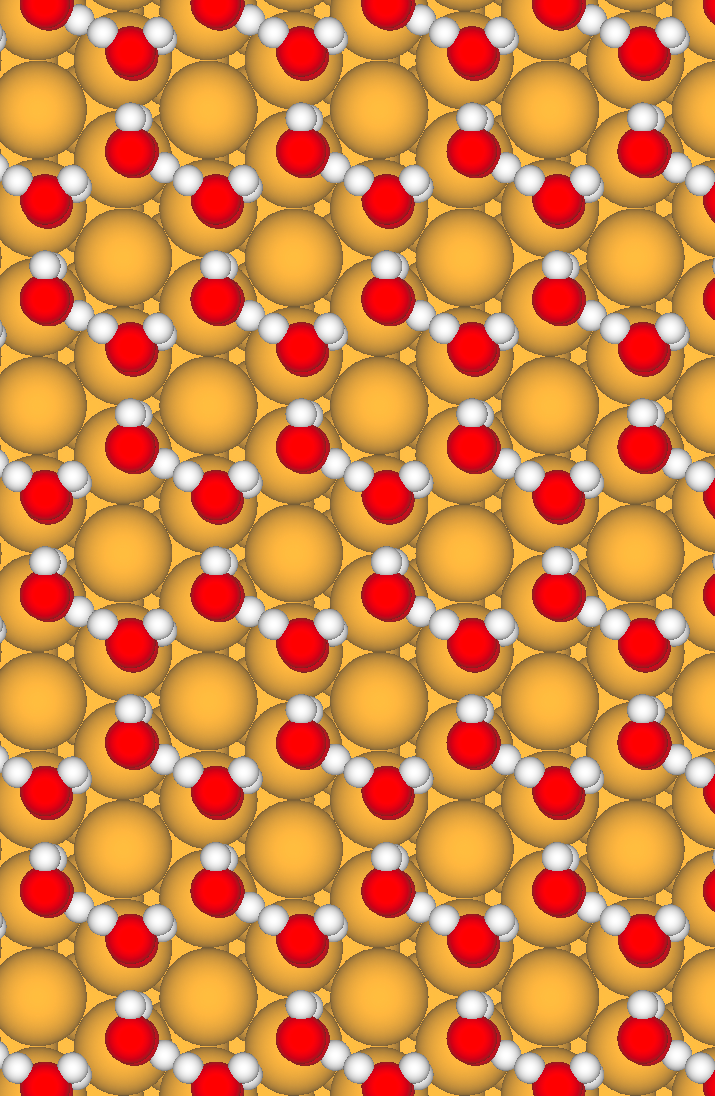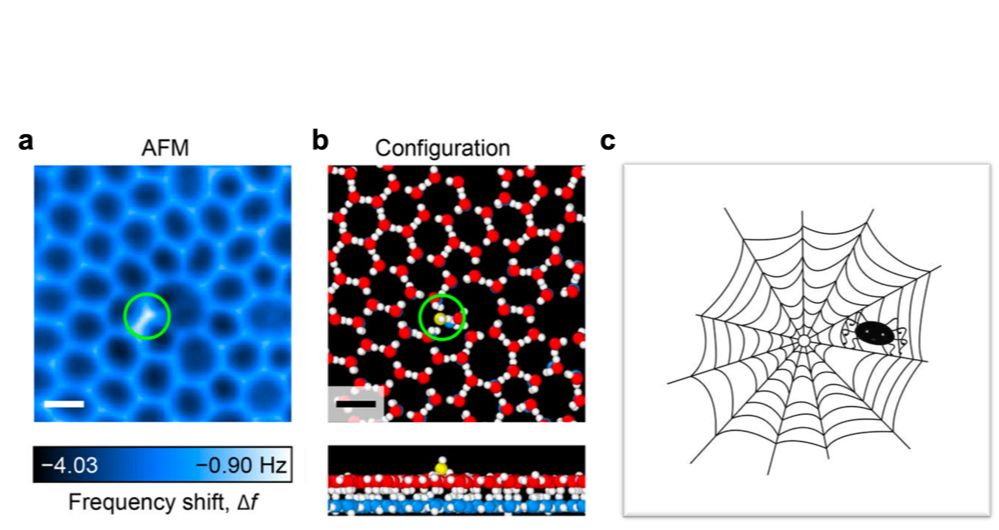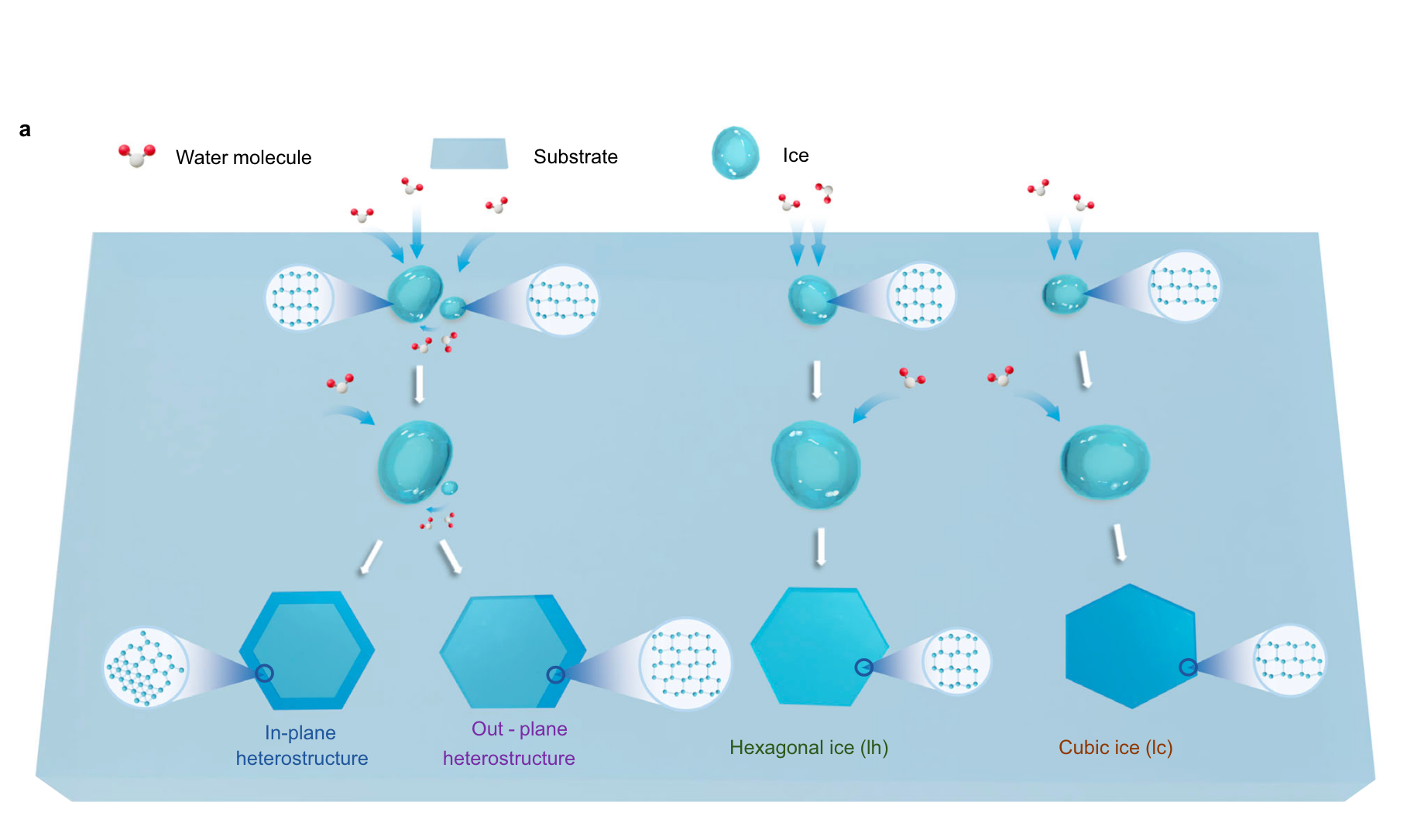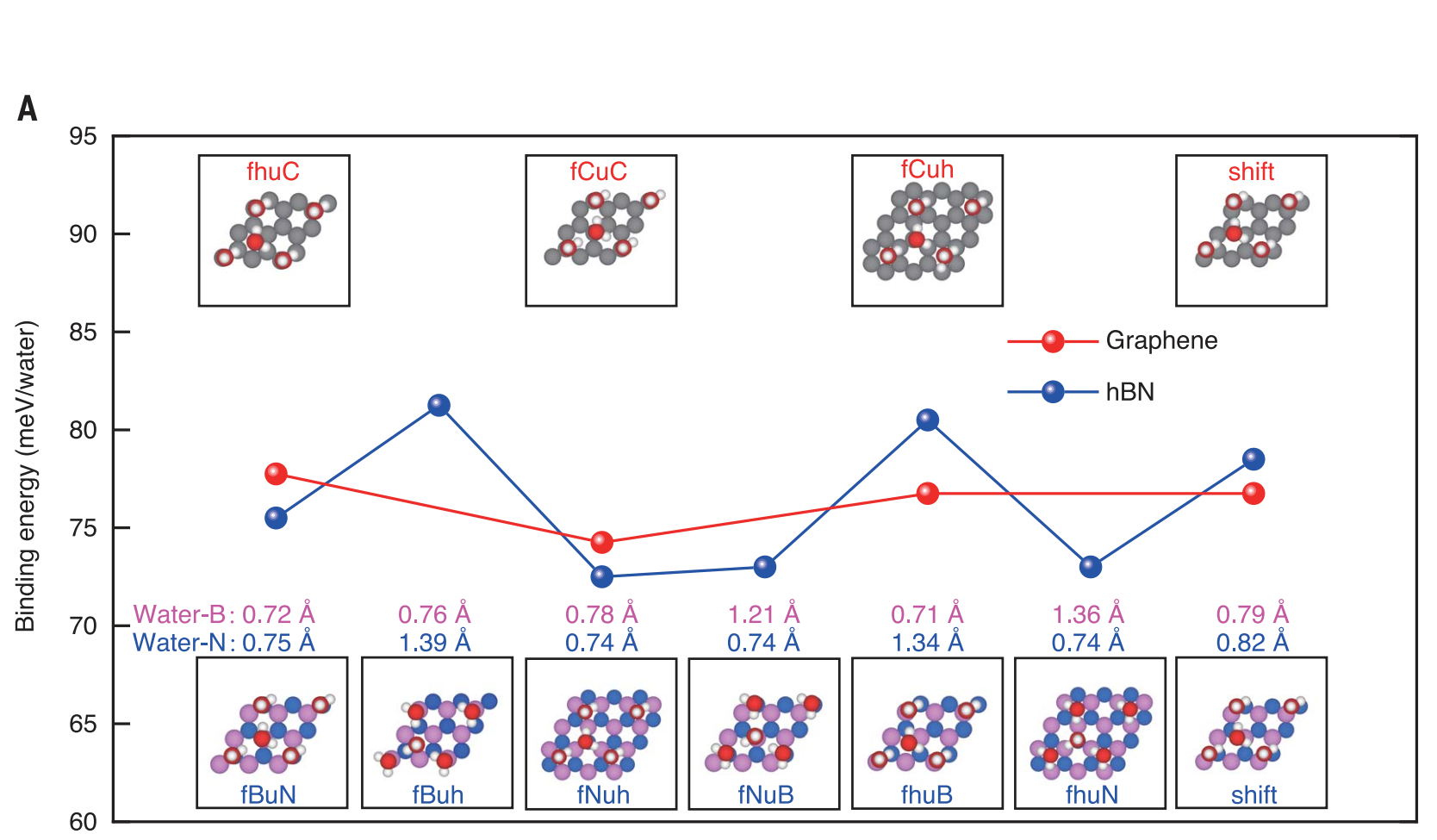
We are a computational research group in soft condensed matter physics and computational physics. Our group focuses on investigating the behavior of matter at the nanoscale, utilizing state-of-the-art computational tools and techniques.
(a) Water science: Structure and phase transition of water, water under nano confinement, water at two-dimensional interfaces, etc.
(b) Theoretical and computational physics: Phase transitions and supercritical phenomena.
(c) Non-equilibrium statistical physics: dynamic and thermodynamic processes of glass transition and crystallization.

Ice begins to change well before it melts. Even far below freezing, its surface forms a thin, liquidlike layer through premelting—a process relevant in cloud formation, cryopreservation, and planetary science. We provide a machine learning framework that combines high-resolution atomic force microscopy and computer simulations to map the ice surface at the atomic level, identifying an amorphous ice layer. This layer is a disordered, solidlike state that appears between 121 and 180 K prior to the liquidlike layer. Recognizing this previously overlooked phase informs our understanding of ice me...

Crystallization is a fundamental process in materials science and natural systems, underpinning phenomena ranging from mineral formation to the fabrication of functional materials. In three dimensional bulk systems, crystallization is commonly described by classical nucleation theory, which involves the formation and growth of a critical nucleus. However, when crystallization occurs in two-dimensional or interfacial environments, the process becomes more complex and may deviate from this classical picture. … Nature Communications 16, 8628 (2025). PKU news Guangming Daily news ![]() PDF Download
PDF Download

The assembly of water molecules on foreign substrates, forming precipitation such as rain and snow, is a ubiquitous phenomenon that influences Earth’s ecosystems and environments. Despite broad and intense research interests, the scenario of these heterogeneous nucleation and growth process remains far from well-understood. In the well-established ice phase diagram … Nature Communications 16, 7349 (2025). ![]() PDF Download
PDF Download

Low-dimensional water transport can be drastically enhanced under atomic-scale confinement. However, its microscopic origin is still under debate. In this work, we revealed the atomic structure and transport of two-dimensional water islands on graphene and hexagonal boron nitride surfaces combining experiment and simulation. The lattice of the water island was incommensurate with the graphene surface but commensurate with the boron nitride surface owing to different surface electrostatics. These results provided the microscopic origin of the frictionless water transport at low dimensions and h...
2025.11 Our paper "Unveiling the amorphous ice layer during premelting using AFM integrating machine learning" was published on Phys. Rev. X.
2025.11 Our review paper "Topological physics in quantum critical systems" was published on Physics Reports.
2025.09 Our paper "Atomic-resolution imaging reveals nucleus-free crystallization in two-dimensional amorphous ice on graphite" was published on Nature Communications.
2025.08 Our paper "Molecularly resolved mapping of heterogeneous ice nucleation and crystallization pathways using in-situ cryo-TEM" was published on Nature Communications.
2025.07 Binze Tang gave an oral presentation at the 8th National Conference on Statistical Physics and Complex Systems, Ningbo, China. Congratulations to Binze!
2025.07 Tiancheng Liang became a Boya Postdoctoral Fellow at Peking University. Congratulations to Tiancheng!
2025.06 Tiancheng Liang has won Excellent Graduate of Peking University & Beijing (city). Congratulations to Tiancheng!
2025.05 Our paper "Hidden order in complex disordered systems ⎯ An introduction to the 2021 Nobel Prize in Physics" has been awarded the College Physics "2022–2024 Outstanding Paper Award".
2025.05 Tiancheng has won the Outstanding Poster Award at the 1st National Conference on Surface and Interface Science of the Chinese Chemical Society, Chengdu, China. Congratulations to Tiancheng!
2025.05 Binze Tang gave an invited presentation at the 1st National Conference on Surface and Interface Science of the Chinese Chemical Society, Chengdu, China. Congratulations to Binze!
2025.05 Our new software, AmorAFM (https://github.com/seasonlo/AmorAFM), which resolves the AFM image of the amorphous ice layer (AIL), was published!
2025.03 Xuejia Yu has been awarded the 2024 Beijing Outstanding Doctoral Dissertation! Congratulations to Xuejia!
2024.11 Zifeng Yuan has been awarded the National Scholarship for Doctoral Students! Congratulations to Zifeng!
2024.06 Tiancheng Liang has won the Peking University President's Scholarship for Doctoral Students! Congratulations to Tiancheng!
2024.05 Our paper "Imaging surface structure and premelting of ice Ih with atomic resolution" was published on Nature.
2024.05 Binze Tang became a Boya Postdoctoral Fellow at Peking University.
2023.12 Our paper "Nanoscale one-dimensional close packing of interfacial alkali ions driven by water-mediated attraction" was published on Nature Nanotechnology.
2023.12 Binze Tang received the Academic Innovation Award, ranking in the top 1% of the entire university at Peking University.
2020.12 Binze Tang received the Lingjun Leading Scholarship at Peking University.
2023.09 Our paper "Spin Nernst effect and spatiotemporal dynamic simulation of topological magnons in the antiferromagnet Cu3TeO6" was published on Phys. Rev. B.
2023.05 Our paper "Quantum criticality of a Z3-symmetric spin chain with long-range interactions" was published on Phys. Rev. E.
2023.05 Our paper "Topology of vibrational modes predicts plastic events in glasses" was published on Nature Communications.
2022.12 Our paper "Machine learning aided atomic structure identification of interfacial ionic hydrates from atomic force microscopy images" was published on Nature Science Review.
2022.11 Our paper "Conformal Boundary Conditions of Symmetry-Enriched Quantum Critical Spin Chains" was published on Phys. Rev. Lett.
2022.11 Binze Tang gave an oral presentation on CPS Fall Meeting 2022, Shenzhen, China. Congratulations to Binze!
2022.10 Our paper "Fidelity susceptibility as a diagnostic of the commensurate-incommensurate transition: A revisit of the programmable Rydberg chain" was published on Physical Review B.
2022.09 Xuejia Yu won the The Peking University Li Huirong Scholarship and Miyoshi Student of Peking University. Congratulations to Xuejia!
2022.07 Our paper "Visualizing Eigen/Zundel cations and their interconversion in monolayer water on metal surfaces" was published on Science.
2021.12 Yizhi Song and Zhiyuan Huang won the Merit Student Prize. Congratulations to Yizhi and Zhiyuan!
2021.10 Zhiyuan Huang won the The Outstanding Teaching Awards for Teaching Assistants. Congratulations to Zhiyuan!
2021.09 Our paper "Advances in Atomic Force Microscopy: Imaging of Two- and Three-Dimensional Interfacial Water" was published on Front. Chem.
2021.08 Our joint work "Cation- and pH- dependent hydrogen evolution and oxidation reaction kinetics" was published on JACS Au.
2021.08 Binze Tang gave a talk on The 6th Conference Statistical Physics and Complex System (SPCSC2021).
2021.05 Our joint work with Fudan University "Fast crystal growth at ultra-low temperatures" was published on Nat. Mater.
2021.04 Our paper "Glass polyamorphism in gallium: Two amorphous solid states and their transformation on the potential energy landscape" was published on J. Chem. Phys.
2020.09 Our paper "Hydration of the Ammonium Ion in Water: Bifurcated Hydrogen Bonding Structures and Fast Rotational Dynamics" was published by Phys. Rev. Lett.
2020.09 Huang Zhiyuan has won the Peking University President's Scholarship for Doctoral Students! Congratulations to Zhiyuan!
2020.03 Our paper "Energy Stored in Nanoscale Water Capillary Bridges between Patchy Surfaces" was published by Langmuir.
2020.02 Our paper "Nuclear quantum effects on the thermodynamic response functions of a polymorphic waterlike monatomic liquid" was published by Phys. Rev. Research.
2019.09 Our paper "Advances in Atomic Force Microscopy: Weakly Perturbative Imaging of the Interfacial Water" was published by Frontiers in Chemistry.
2019.09 Liu Yizhi has won the Merit Student of Peking University. Congratulations to Yizhi!
2018.09 Song Yizhi has won the Peking University President's Scholarship for Doctoral Students! Congratulations to Yizhi!